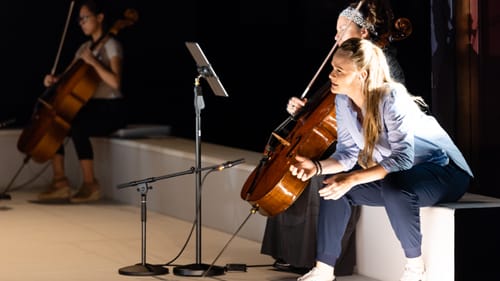Stay in the Loop
BSR publishes on a weekly schedule, with an email newsletter every Wednesday and Thursday morning. There’s no paywall, and subscribing is always free.
Through a smartphone, darkly
Festival 019: Opera Philadelphia presents ‘Denis and Katya’

Denis and Katya, a striking music drama receiving its world premiere as part of Festival O19, might stake a claim as the opera that most closely captures the 21st century’s virtual-reality ethos. The 70-minute work—crafted by composer Philip Venables and librettist/director Ted Huffman, with the aid of translator Ksenia Ravvina—is easily the best original offering I’ve encountered since Opera Philadelphia started presenting these festivals three seasons ago. Rarely has a work felt so connected to the culture in which it was created.
That connection cuts two ways. Venables and Huffman home in on the increasing propensity for people—especially children and teenagers—to live their lives online. The ripped-from-the-headlines story involves two youngsters who livestreamed a crime spree that ended with their suicides using the application Periscope. Yet the work also speaks to a sense of isolation and hopelessness felt by a younger generation facing an uncertain future with rapidly depleting economic, social, and environmental security, all over the world and especially in Russia, where the tale takes place.
Open to interpretation
Denis Muravyov and Katya Vlasova don’t actually appear in the opera that bears their names, though their spirits penetrate every breathless moment. In November 2016, the ninth-graders absconded from the rural city of Pskov, holing up in a hunting cabin with a stockpile of weapons, ammunition, alcohol, and their smartphones. The resulting standoff included gunfights with police, destruction of property, and their self-inflicted deaths. Or did it?
The actual details surrounding Denis and Katya’s final days remain open to interpretation. Did they kill themselves, or were they slain by law enforcement? Did they actually have access to the weapons they purportedly used to, among other things, shoot Katya’s mother in the leg? Was Katya a willing accomplice or a kidnapping victim? Definitive answers will likely never be known, or at least never made public.
The creators feed on this ambiguity, which they discuss at length in instant-messenger conversations that are meta-theatrically projected above Andrew Lieberman’s lightbox set. The distortion of reality is a regular topic of conversation in the social-media age, and Huffman’s dramaturgy shows how peripheral figures shape a narrative that over time becomes accepted and cemented. We never hear Denis and Katya’s actual voices, or see the videos they put out into the internet ether, but we receive testimonies from several tertiary figures connected to the action—a journalist on the story, a teacher at their school, a boy who describes himself as Denis’s best friend.
Starring secondary voices
These characters are given voice by mezzo-soprano Siena Licht Miller and baritone Theo Hoffman. The casting of two youngish singers in these tracks seems a canny choice; they could easily be portraying Denis and Katya, but they’re not. Both sing beautifully—Licht's mezzo has grown more supple at the lower end of its range since her student days at Curtis, and Hoffman’s genuinely lyric instrument projects an individual timbre with satiny legato—and, more to the point, have compelling stage presence. Under Huffman’s direction, the hair-trigger character changes remain crisply individuated and easy to understand.

Venables’s decision to score the piece for four cellos only proves a risk that pays several dividends. The instrument’s mellow, enveloping sound complements the singers, who are subtly amplified by Robert Kaplowitz. Yet the dark, foreboding nature of the low strings suits a story that is ultimately about alienation and mental oppression. Clashing pizzicato and arpeggio suggest the inner turmoil that surrounds the events—the wish that the trajectory could have been changed, the lives saved. The quartet of Rose Bart, Jean Kim, Jennie Lorenzo, and Brandon Yeast perform exceptionally well under Emily Senturia’s musical direction.
Saviors in the audience?
In its final moments, the opera takes a turn toward redemptive storytelling that I wish it would have avoided. It clashes with the spare, unforgiving aesthetic established across the proceeding hour. Yet even with its questionable finale, the work as a whole is one that will live on in my mind for a long time.
The sense of voyeurism, of being starved for attention and existing in an alternate realm, is something every audience member with an iPhone or Android in their pocket will have to confront. “I think they wanted an audience,” sings one character. “Like the audience might save them.” Ask yourself how common the sentiment might be.
What, When, Where
Denis and Katya. By Philip Venables and Ted Huffman, with Ksenia Ravvina, directed by Huffman. Opera Philadelphia. Through September 29, 2019, at the Suzanne Roberts Theatre, 480 S. Broad Street, Philadelphia. (215) 732-8400 or operaphila.org.
The Suzanne Roberts Theatre is a fully accessible venue, with wheelchair seating available on the orchestra and mezzanine levels, with adjacent companion seating. Assisted-listening devices are available on a first-come, first-served basis.
Sign up for our newsletter
All of the week's new articles, all in one place. Sign up for the free weekly BSR newsletters, and don't miss a conversation.

 Cameron Kelsall
Cameron Kelsall